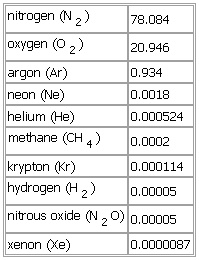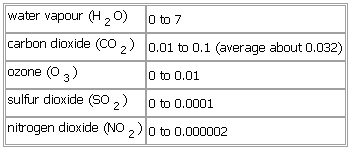- air
-
air1
—airlike, adj./air/, n.1. a mixture of nitrogen, oxygen, and minute amounts of other gases that surrounds the earth and forms its atmosphere.2. a stir in the atmosphere; a light breeze.3. overhead space; sky: The planes filled the air.4. circulation; publication; publicity: to give air to one's theories.5. the general character or complexion of anything; appearance: His early work had an air of freshness and originality.6. the peculiar look, appearance, and bearing of a person: There is an air of mystery about him.7. airs, affected or unnatural manner; manifestation of pride or vanity; assumed haughtiness: He acquired airs that were insufferable to his friends.8. Music.a. a tune; melody.b. the soprano or treble part.c. an aria.d. Also, ayre. an Elizabethan art song.9. aircraft as a means of transportation: to arrive by air; to ship goods by air.10. Informal. air conditioning or an air-conditioning system: The price includes tires, radio, and air.11. Radio. the medium through which radio waves are transmitted.12. Archaic. breath.13. clear the air, to eliminate dissension, ambiguity, or tension from a discussion, situation, etc.: The staff meeting was intended to help clear the air.14. get the air, Informal.a. to be rejected, as by a lover.b. to be dismissed, as by an employer: He had worked only a few days when he got the air.a. to reject, as a lover: He was bitter because she gave him the air.b. to dismiss, as an employee.16. in the air, in circulation; current: There's a rumor in the air that we're moving to a new location.17. into thin air, completely out of sight or reach: He vanished into thin air.18. off the air,a. not broadcasting: The station goes off the air at midnight.b. not broadcast; out of operation as a broadcast: The program went off the air years ago.c. (of a computer) not in operation.19. on the air,a. in the act of broadcasting; being broadcast: The program will be going on the air in a few seconds.b. (of a computer) in operation.20. put on airs, to assume an affected or haughty manner: As their fortune increased, they began to put on airs.21. take the air,a. to go out-of-doors; take a short walk or ride.b. Slang. to leave, esp. hurriedly.c. to begin broadcasting.22. up in the air,a. Also, in the air. undecided or unsettled: The contract is still up in the air.b. Informal. angry; perturbed: There is no need to get up in the air over a simple mistake.23. walk or tread on air, to feel very happy; be elated.v.t.24. to expose to the air; give access to the open air; ventilate (often fol. by out): We air the bedrooms every day.25. to expose ostentatiously; bring to public notice; display: to air one's opinions; to air one's theories.26. to broadcast or televise.v.i.27. to be exposed to the open air (often fol. by out): Open the window and let the room air out.28. to be broadcast or televised.adj.29. operating by means of air pressure or by acting upon air: an air drill; an air pump.30. of or pertaining to aircraft or to aviation: air industry.31. taking place in the air; aerial: air war.[1150-1200; ME eir < OF air < L aer- (acc. aerem) < Gk aer- (s. of aér) the lower atmosphere; conflated with (esp. for defs. 4 and 5) F air, OF aire nature, character < L ager field (cf. ACRE) and area threshing floor, clearing, AREA; and with (for def. 7) F air < It aria ARIA]air2/air/, Scot.adj.1. early.adv.2. Obs. before; previously.[see ERE]
* * *
IMixture of gases constituting the earth's atmosphere.Some gases occur in steady concentrations. The most important are molecular nitrogen (N2), 78% by volume, and molecular oxygen (O2), 21%. Small amounts of argon (Ar; 1.9%), neon (Ne), helium (He), methane (CH4), krypton (Kr), hydrogen (H2), nitrous oxide (N2O), and xenon (Xe) are also present in almost constant proportions. Other gases occur in variable concentrations: water vapour (H2O), ozone (O3), carbon dioxide (CO2), sulfur dioxide (SO2), and nitrogen dioxide (NO2). Air also contains trace amounts of ammonia and hydrogen sulfide. The variable constituents are important for maintaining life. Water vapour is the source for all forms of precipitation and is an important absorber and emitter of infrared radiation. Carbon dioxide is necessary for photosynthesis and is also an important absorber and emitter of infrared radiation. Ozone in the stratosphere (see ozone layer) is an effective absorber of ultraviolet radiation from the Sun but at ground-level is a corrosive pollutant and a major constituent of smog.II(as used in expressions)Compagnie Internationale Air Franceair cushion vehicleEastern Air Lines Inc.* * *
▪ atmospheric gasmixture of gases comprising the Earth's atmosphere. The mixture contains a group of gases of nearly constant concentrations and a group with concentrations that are variable in both space and time. The atmospheric gases of steady concentration (and their proportions in percentage by volume) are as follows:nitrogen (N2) 78.084oxygen (O2) 20.946argon (Ar) 0.934neon (Ne) 0.0018helium (He) 0.000524methane (CH4) 0.0002krypton (Kr) 0.000114hydrogen (H2) 0.00005nitrous oxide (N2O) 0.00005xenon (Xe) 0.0000087See as table: The uniformity of composition is maintained by mixing associated with atmospheric motions; but, above a height of about 90 km (55 miles), diffusional processes become more important than mixing, and the lighter gases (hydrogen and helium, in particular) are more abundant above that level.Of the gases present in variable concentrations, water vapour, ozone, carbon dioxide, sulfur dioxide, and nitrogen dioxide are of principal importance. The typical concentration ranges of these gases (in percentage by volume) are as follows:water vapour (H2O) 0 to 7carbon dioxide (CO2) 0.01 to 0.1 (average about 0.032)ozone (O3) 0 to 0.01sulfur dioxide (SO2) 0 to 0.0001nitrogen dioxide (NO2) 0 to 0.000002See as table:
The uniformity of composition is maintained by mixing associated with atmospheric motions; but, above a height of about 90 km (55 miles), diffusional processes become more important than mixing, and the lighter gases (hydrogen and helium, in particular) are more abundant above that level.Of the gases present in variable concentrations, water vapour, ozone, carbon dioxide, sulfur dioxide, and nitrogen dioxide are of principal importance. The typical concentration ranges of these gases (in percentage by volume) are as follows:water vapour (H2O) 0 to 7carbon dioxide (CO2) 0.01 to 0.1 (average about 0.032)ozone (O3) 0 to 0.01sulfur dioxide (SO2) 0 to 0.0001nitrogen dioxide (NO2) 0 to 0.000002See as table: Although present in relatively small amounts, these variable constituents may be very important for maintaining life on Earth's surface. Water vapour is the source for all forms of precipitation and is an important absorber and emitter of infrared radiation. carbon dioxide, besides being involved in the process of photosynthesis, is also an important absorber and emitter of infrared radiation. Ozone, which is present mainly in the atmospheric region 10 to 50 km (6 to 30 miles) above the Earth's surface, is an effective absorber of ultraviolet radiation from the Sun and effectively shields the Earth from all radiation of wavelengths less than 3,000 angstroms.
Although present in relatively small amounts, these variable constituents may be very important for maintaining life on Earth's surface. Water vapour is the source for all forms of precipitation and is an important absorber and emitter of infrared radiation. carbon dioxide, besides being involved in the process of photosynthesis, is also an important absorber and emitter of infrared radiation. Ozone, which is present mainly in the atmospheric region 10 to 50 km (6 to 30 miles) above the Earth's surface, is an effective absorber of ultraviolet radiation from the Sun and effectively shields the Earth from all radiation of wavelengths less than 3,000 angstroms.* * *
Universalium. 2010.
